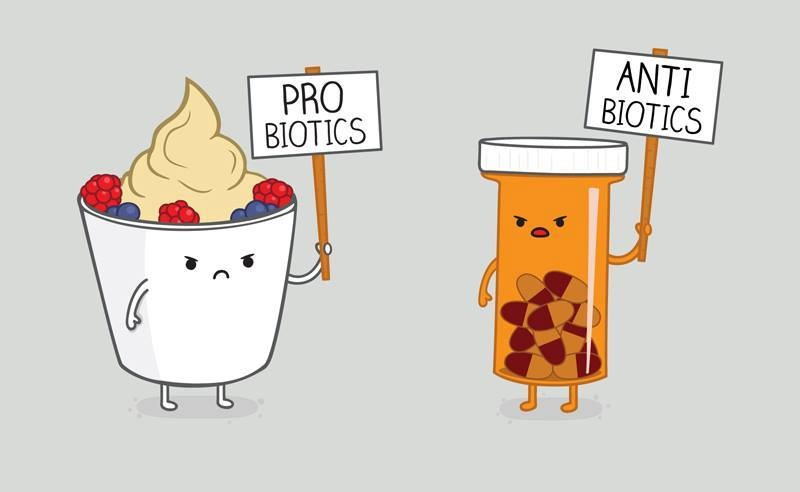Probiotics- Helpful or just Hype?
It’s become very apparent that a healthful diet of nourishing, well-balanced foods is simply not enough! If we truly want to live a vibrant life, feel energetic (and I mean all day long) and prevent illness through a well-functioning immune system, we must first address our gastrointestinal (GI) function. In the US, a large majority of us are consuming an “Americanized” diet and therefore are lacking essential micronutrients and, are also getting billions fewer healthful bacteria every day than required to maintain healthy immune system and GI functions.
The GI tract is one of the largest organs in the body and is a system that hosts over 800 species of microorganisms. These microflora are crucial to the immune system function, and have many other important responsibilities including: supplying our body nutrients and vitamins, enabling nutrient absorption, acting as a barrier against both internal and external toxins such as bacterial waste, drugs, chemicals and food antigens (foreign proteins). Microflora also aid in the metabolism of cholesterol, bile acids, and hormones. Dietary deficiencies of these healthful bacteria are associated with a myriad of health problems (see my previous post about Food Sensitivities & Your Immune System to get a small example of potential issues).
The good news is that these healthful microflora that are lacking in our modern diets can be supported by prebiotics and probiotics. Prebiotics are nondigestible food products that stimulate the growth of interdependent bacterial species (that are already in the colon) and that improve the health of the host. Probiotics are microbial foods or supplements that can be used to change or reestablish the intestinal flora and improve the health of the host. Healthful probiotic bacteria must survive the passage through the highly acidic stomach before they arrive in the more distal small intestine and colon. Because this process can often destroy the healthful bacteria during their journey through the GI tract, a high potency probiotic preparation helps ensure that adequate numbers of microorganisms survive to reach the distal small bowel and colon where they can exert their beneficial effects.
Not all probiotics are created equal, however. Fermented food products contain forms of beneficial bacteria. Fermentation has had a long history in human food production and consumption. Fermented foods and beverages can comprise anywhere between 5-40% of the human diet in some populations. Fermented foods, including live culture yogurts, kefirs, sauerkraut, miso, kombucha and tempeh are just a few examples that contain beneficial probiotics. The concentration of beneficial bacteria contained in these foods can vary significantly, and often only a single strain or a few are included in the food products labeled “contains live active cultures.” This doesn’t mean that you shouldn’t bother with these foods, but often times with these foods comes added sugars, which does nothing to benefit our health!
One of the easiest and most effective ways to include probiotics in greater concentrations is through a high quality supplement. Numerous studies support the superiority of a “multispecies” probiotic formulation compared to single strains in their ability to synergistically transform the GI colonization, which in turn, increases nutrient absorption from our foods and makes our bodies more capable of fighting pathogens.
Probiotic are measured by colony forming units (CFU’s), and with this measurement, more is better!! (For example “BILLIONS” of CFU’s are better than “MILLIONS”). Bottom line is, probiotics are extremely helpful in maintaining good overall health and allowing our nutritious foods eaten to have maximum absorption and utilization benefits.
At Cooper Chiropractic, we source our supplements directly from Klaire Labs because of their commitment to provide the highest potency and quality products available.
Ther-Biotic® Complete capsules contain 25+ BILLION colony forming units (CFUs)!! Therefore, this Ther-Biotic® probiotic with 12 probiotic species can be expected to provide more beneficial results than a probiotic containing only one or two individual species.


